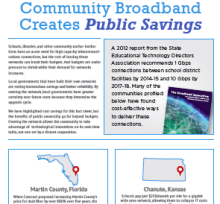New Fact Sheet: Community Broadband and Public Savings
We have already published a fact sheet on the critical role community broadband plays in job development. Now, ILSR presents a collection of how community owned broadband networks save money for local government, schools, and libraries while providing cutting edge services. The Public Savings Fact Sheet is now available.
Though schools, libraries, and other community anchors need access to faster, more reliable networks, the big cable and telephone companies have priced those services so high that they are breaking the budget. But when communities create their own connections, affordable high capacity connections are only one of the benefits. A community owned network offers the promise of self-determination -- of upgrades on the community's time table and increased reliability for emergency responders.
The Public Savings Fact Sheet is a great piece to share to mobilize other members of your community. Share it with decision makers and use it to start meaningful conversations. Distribute it widely and often.
We are always developing new resources. If you have an idea for a new fact sheet, we want to hear it.




